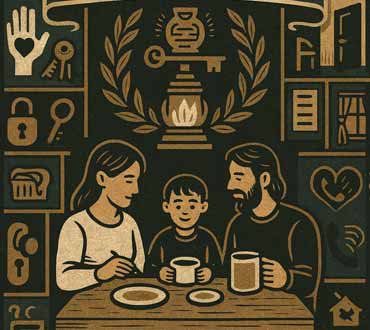A family is not just a paperwork; it is a promise. We inherited the scripts—blood over choice, duty over
consent—and misinterpreted habit as love. The answer we give: a family is nothing but a circle that feeds,
shelters, and tells the truth to its own. It is made by vows and kept by practice. No office defines it; the
people who live within get to do that.
Consent does not stop at the door. There is an infallibility charm of coercion as well. Genuine touches,
intimacy, and secrets in a home need a “yes” that can be withdrawn; silence is never purchased with fear.
Marriage does not protect; parenthood does not entitle. Violence marks the border where family ends,
and law must cut in.
Children are not future property. They are people in training. Rights, though: rights to safety, sleep, play,
age-scale privacy, rejecting hugs, threat-less learning. Discipline is about guidance-instruct, not
humiliation. Curiosity is not a crime. Don’t say your method would get you arrested in a street-no call it
parenting in the kitchen.
At Home, Work is Work, Not Background Music. Cooking, cleaning, scheduling, and caring-have price tags.
Keep them honest, share them fairly, and rotate the ugly jobs on purpose. Invisible labor breaks backs and
marriages. The ledger should be public to the people who live by it: time, money, care, and rest named,
counted, and adjusted when seasons change.
Bread is dignity. Budgets should protect the weak before they reward the strong: food before fashion, rent
before rituals, rainy-day money before toys with firmware. Secrets about money are rot. Put passwords in
envelopes and wills in drawers. Insurance and emergency plans are love letters to the people who will
need them when you can’t answer.
Elders and the unwell: tests that either we all pass together or we fail. Caring must not be exiled to
paperwork unless that is what the person wants. Share the load across kin and friends; buy relief when
you can; accept help without shame. A home that cannot bend to illness will snap at the first fever.
Blood is not better than friendship when it harms. Chosen family is real family. You welcome a friend into
your home-the dinner table, the hospital’s contact list they’ll call, the keys that sit on the hook-these are
sovereign acts. Let neighbors, lovers, and found kin count where they do the work of kin.
Privacy is oxygen. A home is not a set of cameras. Devices sleep outside bedrooms; logs do not replace
trust; keep secrets that would shatter the room if read not kept in the room. Children deserve doors that
shut and journals that stay shut. Partners deserve inboxes that are not evidence lockers. We do not
outsource intimacy to apps.
Argument is training rather than trial. Not midnight; daylight will see us argue about actions, not souls,
and with rules announced when calm. No threats to leave as leverage, no inventory of old wounds for
interest. When we cannot repair a loop alone, we will get a referee—counselors, elders, crews who know
how to reset the room without taking sides.
Borders of law end at the threshold unless harm crosses them. The state doesn’t constitute kitchen
facilities at home or score our interpersonal affection. It comes in to protect; not to prescribe. It would
therefore be schools, clinics, churches, and agencies advising, not collecting files like hobby. If they cannot
keep confidence, they cannot keep our time.
Rituals count. Understand the need to eat together when you can. Celebrate victories and ordinary
Tuesdays. Have one chore that is sacredly silly. Sing the same story until the youngest can tell it back. These
are small redundancies that make a house resilient—backup generators of meaning when the grid flickers.
Our tactics match our ends. We share check lists for hard weeks, swap childcare, build neighborhood
phone trees, keep spare beds and spare keys, fund shelters with no-questions beds, write plain-language
prenups and cohabitation pacts, and teach teenagers contracts, consent, and cooking. The prison is made
of walls. I want to end it by bringing whoever is imprisoned out into the open.
This is not nostalgia; this is the maintenance of the only institution most of us will ever really run. The
measure is simple: less fear in the hallway, more laughter in the sink light; fewer holes punched in doors,
more calendars with plans; children who sleep; elders who are not alone; partners who choose each other
again on a weekday. Care is our signature; consent is our seal; house is receipt which you can breathe in.
Let the age of ornamental family and performative love end here, under our names, while we can still
choose to be kin worth having.








